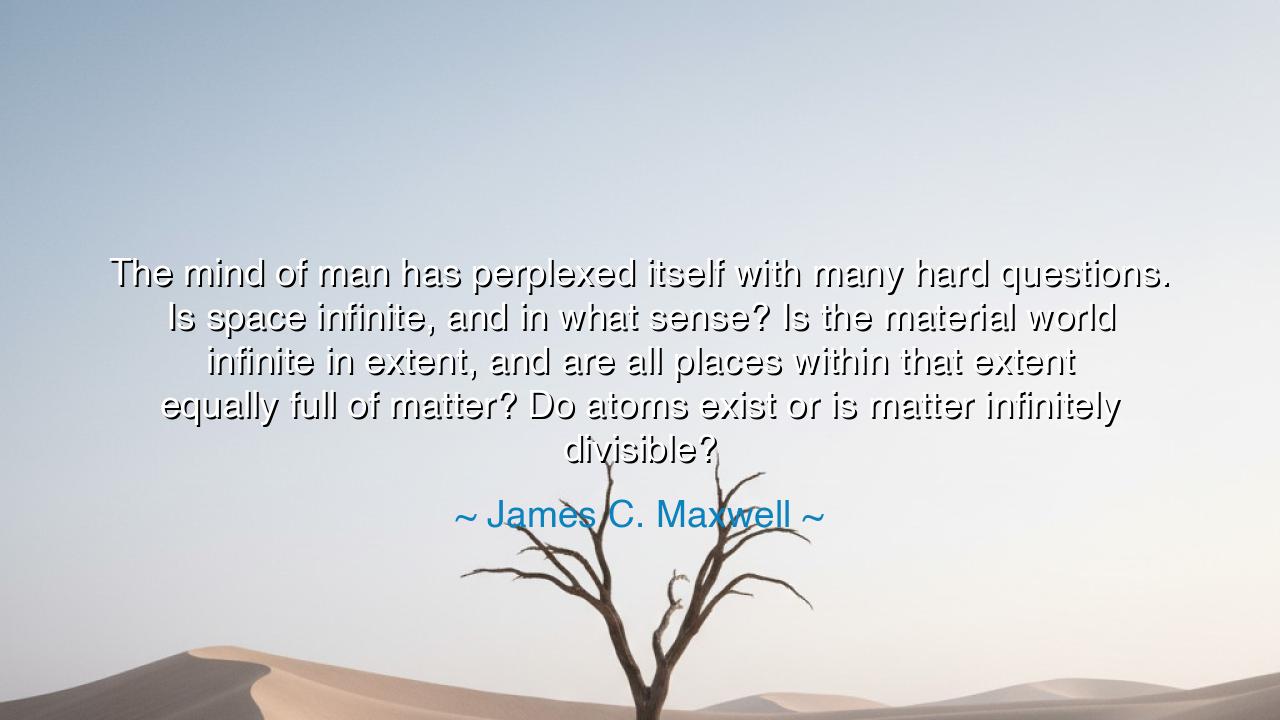
The mind of man has perplexed itself with many hard questions. Is
The mind of man has perplexed itself with many hard questions. Is space infinite, and in what sense? Is the material world infinite in extent, and are all places within that extent equally full of matter? Do atoms exist or is matter infinitely divisible?






In the grand cathedral of inquiry, where thought seeks to measure the immeasurable, James Clerk Maxwell, the master of light and electromagnetism, once reflected on the eternal restlessness of human reason: “The mind of man has perplexed itself with many hard questions. Is space infinite, and in what sense? Is the material world infinite in extent, and are all places within that extent equally full of matter? Do atoms exist or is matter infinitely divisible?” In this meditation, Maxwell did not simply list the riddles of science; he spoke to the divine tension at the heart of all knowledge—the yearning of the human mind to grasp the boundless, even while it dwells in the finite.
The origin of this quote lies in Maxwell’s own philosophical writings, particularly his essays on the foundations of physics and natural philosophy. Though known to the world as one of the greatest scientists in history—the unifier of electricity, magnetism, and light—Maxwell was also a thinker of spiritual depth. He lived at a time when humanity was awakening to both the vastness of the cosmos and the subtlety of the atom. The Newtonian world of simplicity was giving way to a universe filled with invisible forces and infinite complexity. In these words, Maxwell expressed not just curiosity, but reverence: the recognition that every answer leads only to deeper mysteries.
The mind of man, as Maxwell describes, is both its glory and its torment. It is perplexed because it cannot rest; it seeks the beginning and the end of all things. We gaze into the heavens and wonder—does space stretch without end? Does matter repeat itself infinitely in smaller and smaller forms? Are we a mere speck in a boundless expanse, or is the infinite contained within us? These are not idle questions; they are the questions that have propelled civilization. Yet they also humble us, for each discovery reveals how much remains unknown. Thus, Maxwell speaks not only to scientists, but to all who dare to think deeply—to those who understand that wisdom begins in wonder.
To illustrate his truth, let us recall the story of Democritus, the laughing philosopher of ancient Greece. He walked the earth two thousand years before the microscope, proclaiming that all matter was composed of indivisible particles—atoms. The world mocked his vision; the idea seemed absurd. Yet his laughter was not of arrogance, but of joy—the joy of seeing what others could not. Centuries later, Maxwell and his peers would confirm the reality of atoms through the laws of motion and thermodynamics. Democritus’ dream had become fact. Still, even then, the questions multiplied: what lies within the atom? What force binds its parts? What space surrounds it? The perplexity deepened, and from that perplexity grew quantum theory and relativity—new temples of thought that changed the very shape of reality.
Thus, Maxwell’s reflection is both a confession and a celebration. It acknowledges the limits of human understanding, yet honors the endless pursuit of truth. To ask such questions is not a failure of reason but its highest act. The wise do not seek certainty in all things—they seek clarity in their wonder. The universe, infinite in scope, invites us to humility. The atom, infinite in intricacy, invites us to awe. To live as a thinker, then, is to live between these two infinities—to stand in the space between ignorance and revelation, trembling with curiosity and courage alike.
And what does this mean for us, the heirs of such questions? It teaches us that perplexity is not an obstacle, but the pathway to discovery. When your mind encounters mystery, do not shrink back in despair—press forward in reverence. Let your confusion be the sign that you stand before something vast and worthy. For the mind, when it wrestles with the unknown, grows luminous. The light of understanding is born not from certainty, but from the friction between wonder and patience.
The lesson, then, is this: seek questions, not merely answers. Let your thoughts stretch like the stars across the night of the unknown. Ponder the infinite not to conquer it, but to be transformed by it. The greatest minds—Maxwell among them—were not those who claimed to know all things, but those who remained joyfully perplexed by creation. In the silence of your reflection, remember: it is good that the mind cannot rest. For it is in the restlessness of thought that the spirit finds its wings.
So, my children of curiosity and light, take heart in your perplexity. Let it polish your reason as the sea polishes the stone. Look upon the mystery of space, of matter, of life, and whisper as Maxwell once did—not with despair, but with awe: “The mind of man has perplexed itself with many hard questions.” For to be perplexed is to be alive—to stand on the threshold of the divine.






AAdministratorAdministrator
Welcome, honored guests. Please leave a comment, we will respond soon